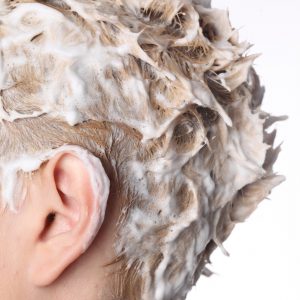
Psoriasis is a chronic inflammatory skin disorder1. Some characteristic symptoms of this condition include itchiness, lesions, skin flaking, and swelling2. In a survey of 792 patients who had psoriasis, it was found that 79% of these patients had psoriasis of the scalp.3 As mentioned in a previous blog, scalp psoriasis is common and occurs in approximately 5% of the population4.
There are many different types of therapies available to treat scalp psoriasis. Topical treatments are your first line of defense1. Other options can include oral medications and ultraviolet light therapy5. Some examples of topical treatments for scalp psoriasis are shampoos, steroids and vitamin D derivatives5. The choice of which topical treatment to use is typically based on what your main symptoms are. For example calcipotriol, available in an ointment, is a good option when plaques are the main symptom1. Salicylic acid, available in a shampoo, is a better option when scaling is the main symptom1. Not all topical treatments have the same ability to clear scalp psoriasis symptoms. For example steroids, as found through four separate studies, seemed better at clearing scalp psoriasis symptoms than vitamin D6.
UVB phototherapy and oral treatments are additional examples of available treatment options. Patients have reported substantial improvement in their psoriasis symptoms with the use of UVB phototherapy7. Some oral treatments for scalp psoriasis include methotrexate, cyclosporine and acitretin8. These treatments have properties that can combat psoriasis such as anti-inflammatory and immunosuppressive capabilities1. Since psoriasis is a complex condition using a combination of treatments might be a good option as well. More recently biologics have become available.
These are just a few of the many therapies that are available for psoriasis. Be sure to speak with your doctor about which treatment option would work best for you. There are also many other resources that you can check out such as the Canadian Dermatology Association and the Psoriasis Society of Canada.
Article by: Sarah Versteeg MSc, Mediprobe Research Inc.
- van de Kerkhof PC, Franssen ME. Psoriasis of the scalp. Diagnosis and management. Am J Clin Dermatol. 2001;2(3):159–65.
- Esposito M, Saraceno R, Giunta A, Maccarone M, Chimenti S. An Italian study on psoriasis and depression. Dermatol Basel Switz. 2006;212(2):123–7.
- van de Kerkhof PC, Steegers-Theunissen RP, Kuipers MV. Evaluation of topical drug treatment in psoriasis. Dermatol Basel Switz. 1998;197(1):31–6.
- Naldi L. Epidemiology of psoriasis. Curr Drug Targets Inflamm Allergy. 2004 Jun;3(2):121–8.
- Guenther L. Current management of scalp psoriasis. Skin Ther Lett. 2015 Jun;20(3):5–7.
- Schlager JG, Rosumeck S, Werner RN, Jacobs A, Schmitt J, Schlager C, et al. Topical treatments for scalp psoriasis. Cochrane Database Syst Rev. 2016;2:CD009687.
- Mehta D, Lim HW. Ultraviolet B Phototherapy for Psoriasis: Review of Practical Guidelines. Am J Clin Dermatol. 2016 Apr;17(2):125–33.
- Mahmood T, Zaghi D, Menter A. Emerging oral drugs for psoriasis. Expert Opin Emerg Drugs. 2015 Jun;20(2):209–20.












